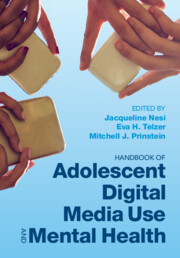Jacqueline Nesi, PhD, is an assistant professor in the Department of Psychiatry and Human Behavior at the Warren Alpert Medical School of Brown University. Nesi earned her BA in Psychology at Harvard University and her PhD in Clinical Psychology at the University of North Carolina at Chapel Hill. She completed her internship and postdoctoral fellowship at the Brown University Clinical Psychology Training Consortium. Nesi’s research examines the role of social media in adolescents’ peer relationships and mental health, with a focus on depression and suicidal thoughts and behavior. Her research has been funded by the National Institute of Mental Health, the Eunice Kennedy Shriver National Institute of Child Health and Development, the American Foundation for Suicide Prevention, and the National Science Foundation. She has published in numerous peer-reviewed journals, including Clinical Psychology Review and the Journal of the American Academy of Child and Adolescent Psychiatry, and her work has been featured in popular media outlets such as The Wall Street Journal and Teen Vogue. She has also served as an invited speaker for the Society for Research on Adolescence and the National Academies of Sciences, Engineering, and Medicine. She is passionate about understanding how and for whom social media influences adolescents’ mental health, so as to identify and intervene with youth most at risk.
Eva H. Telzer, PhD, is an associate professor of psychology and neuroscience at the University of North Carolina at Chapel Hill. She received her PhD in Developmental Psychology from University of California–Los Angeles. Her research examines how social and cultural processes shape adolescent brain development, with a focus on both prosocial and risk-taking behaviors, family and peer relationships, and long-term psychological well-being. She is an associate editor for Child Development and Social Cognitive Affective Neuroscience. She has authored more than 160 publications in peer-reviewed journals, 9 book chapters, and an edited book on culture and biology interplay. Telzer has received numerous awards for her work, including a NARSAD Young Investigator Grant, a Jacobs Foundation Early Career Research Fellowship, an Early Career Award from the Society for Research on Adolescence, and the Boyd McCandless Award for Early Career Contributions to Developmental Psychology from the American Psychological Association Division 7, and she was named a Rising Star by the Association for Psychological Science. Her research is supported by the National Science Foundation, Brain and Behavior Research Foundation, National Institute of Drug Abuse, National Institute of Mental Health, and the Jacobs Foundation. In her free time she enjoys drawing biological illustrations, hiking with her dog, and baking sourdough.
Mitchell J. Prinstein, PhD, is the John Van Seters Distinguished Professor of Psychology and Neuroscience at the University of North Carolina at Chapel Hill and Chief Science Officer at the American Psychological Association. He received his PhD in Clinical Psychology from the University of Miami and completed his internship and postdoctoral fellowship at the Brown University Clinical Psychology Training Consortium. Prinstein’s research examines interpersonal models of internalizing symptoms and health risk behaviors among adolescents, with a specific focus on the unique role of peer relationships in the developmental psychopathology of depression and self-injury. He is the PI on several past and active grants from the National Institute of Mental Health, the National Institute of Child and Human Development, and several private foundations. He served as the editor for the Journal of Clinical Child and Adolescent Psychology and is an editorial board member for several developmental psychopathology journals. He has received several national and university-based awards recognizing his contributions to research (American Psychological Association Society of Clinical Psychology Theodore Blau Early Career Award; Columbia University/Brickell Award for research on suicidality; American Psychological Association Fellow of the Society of Clinical Child and Adolescent Psychology and the Society of Clinical Psychology), teaching (UNC Chapel Hill Tanner Award for Undergraduate Teaching; Psi Chi Professor of the Year), and professional development of graduate students (American Psychological Association of Graduate Students Raymond D. Fowler Award) and undergraduate students (Psychology Club Department Research Mentor Award).

